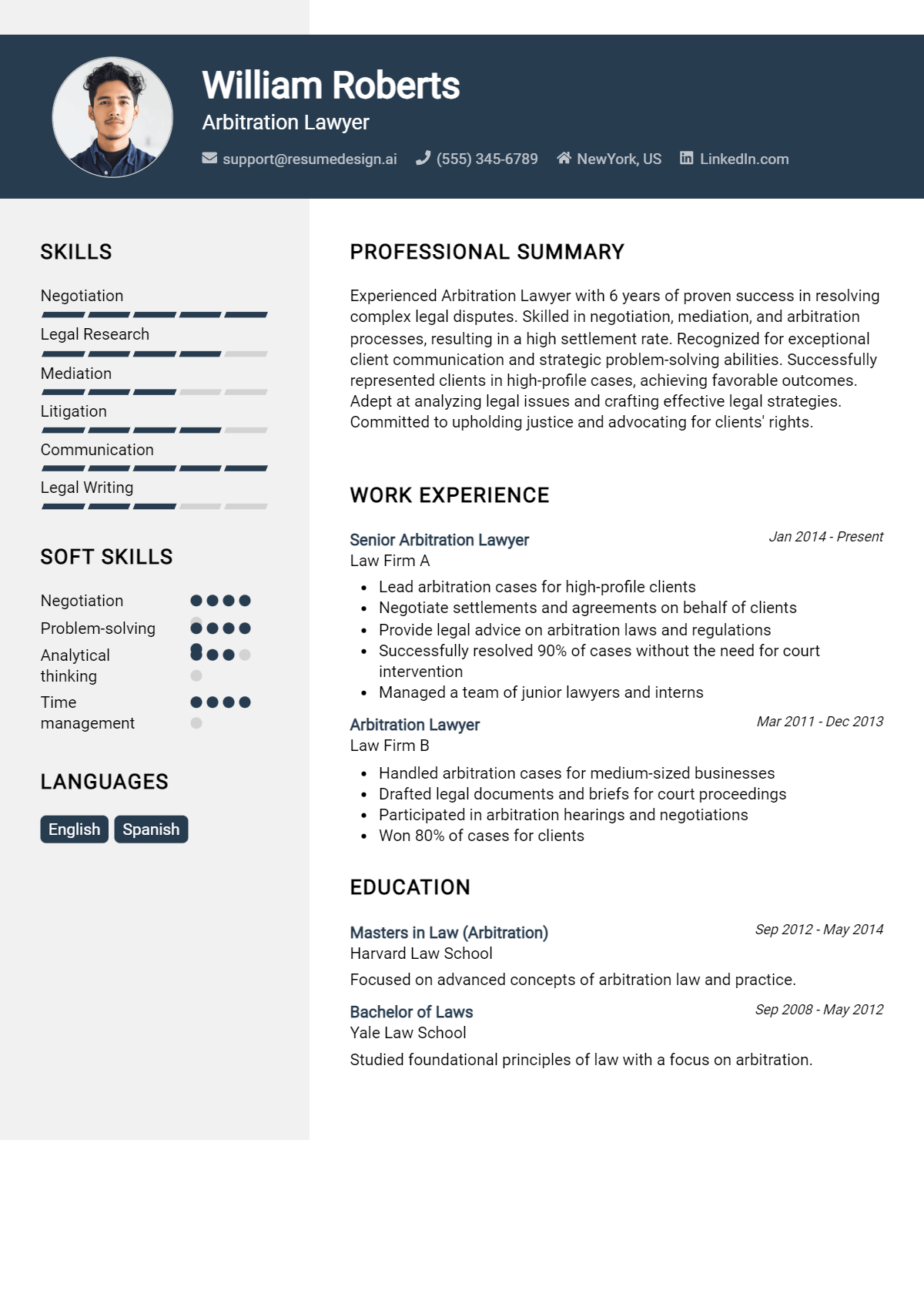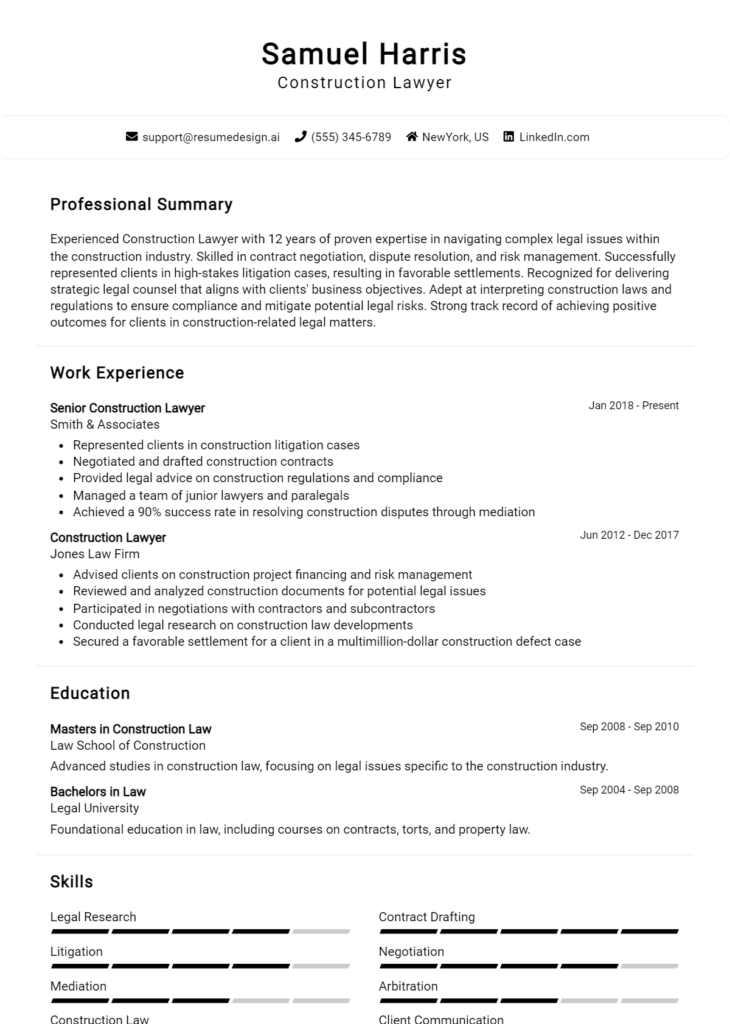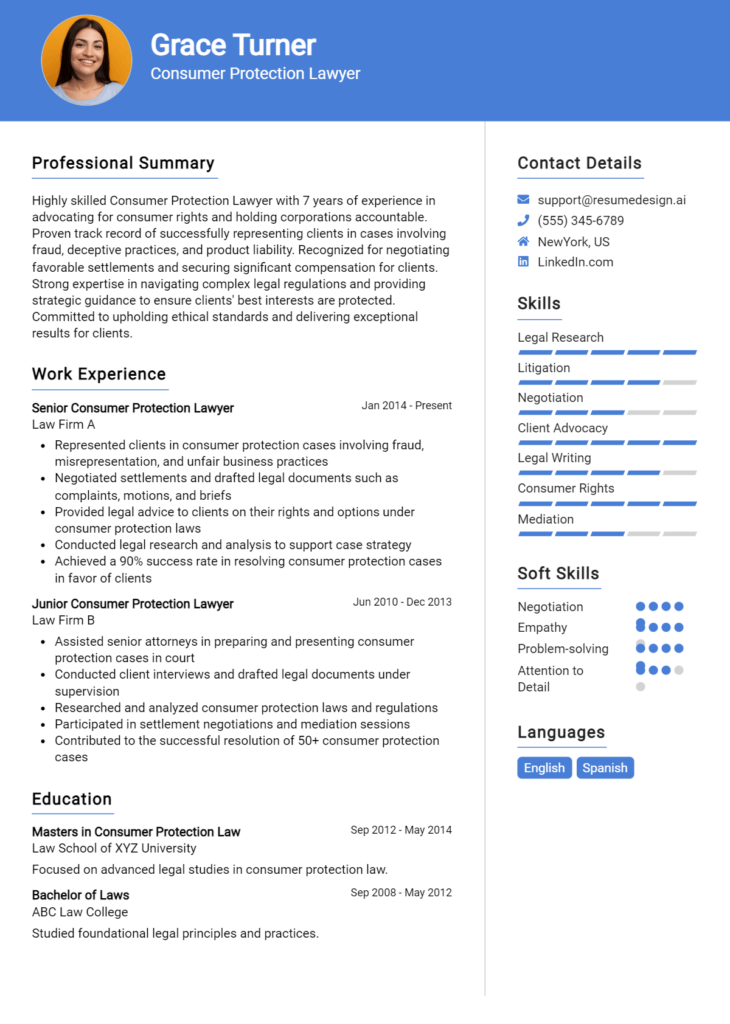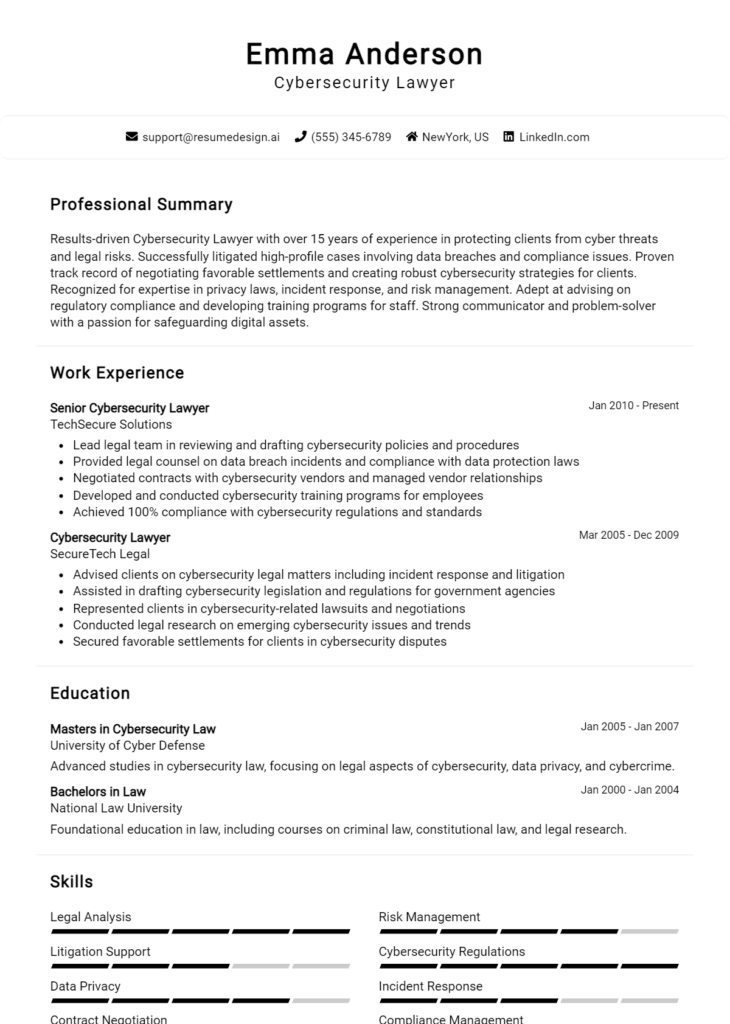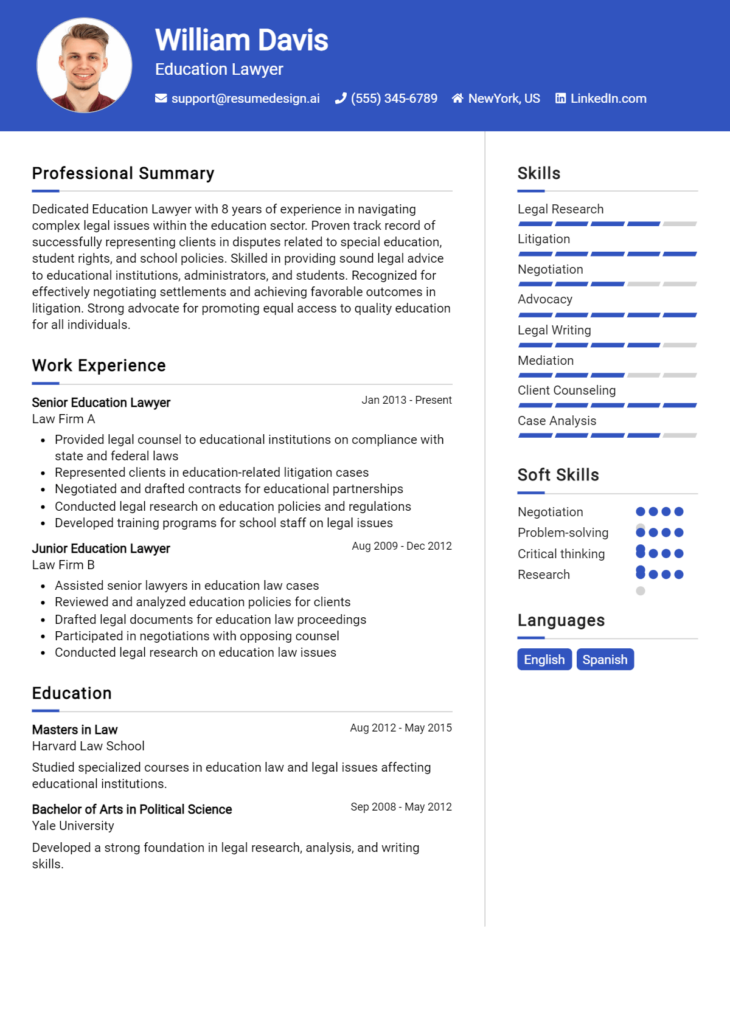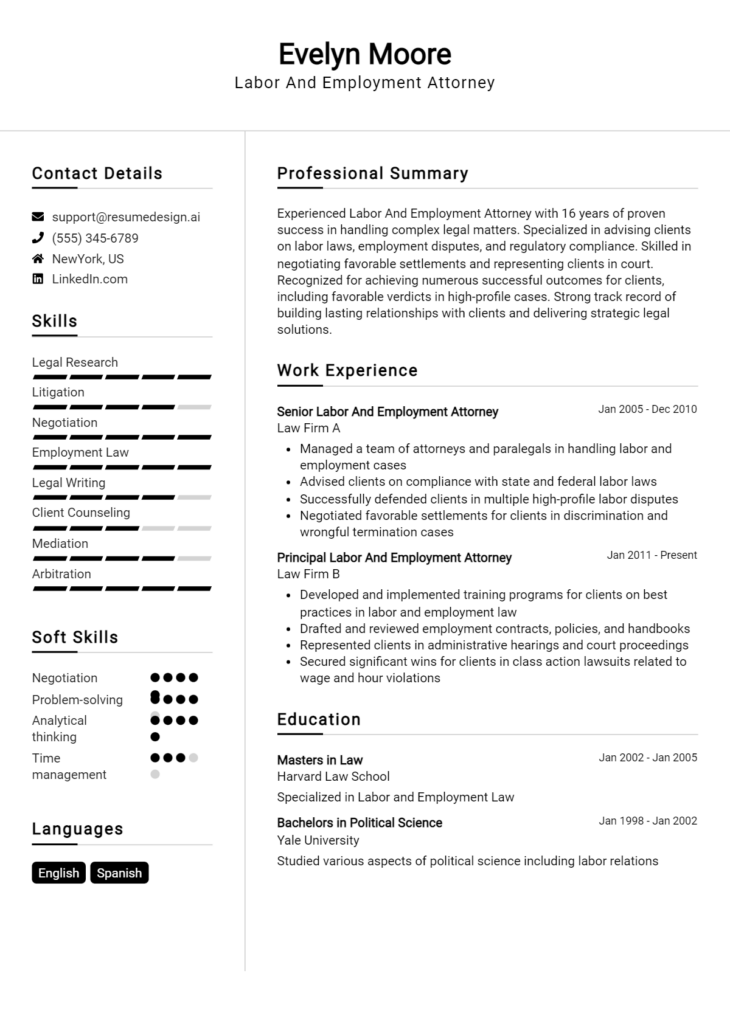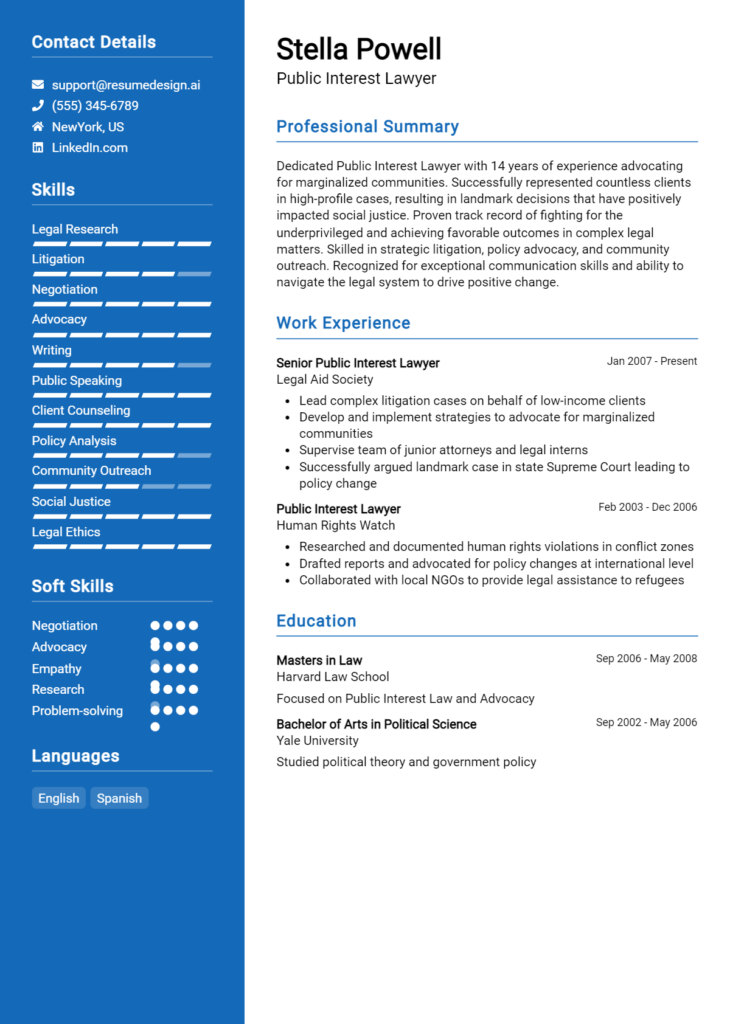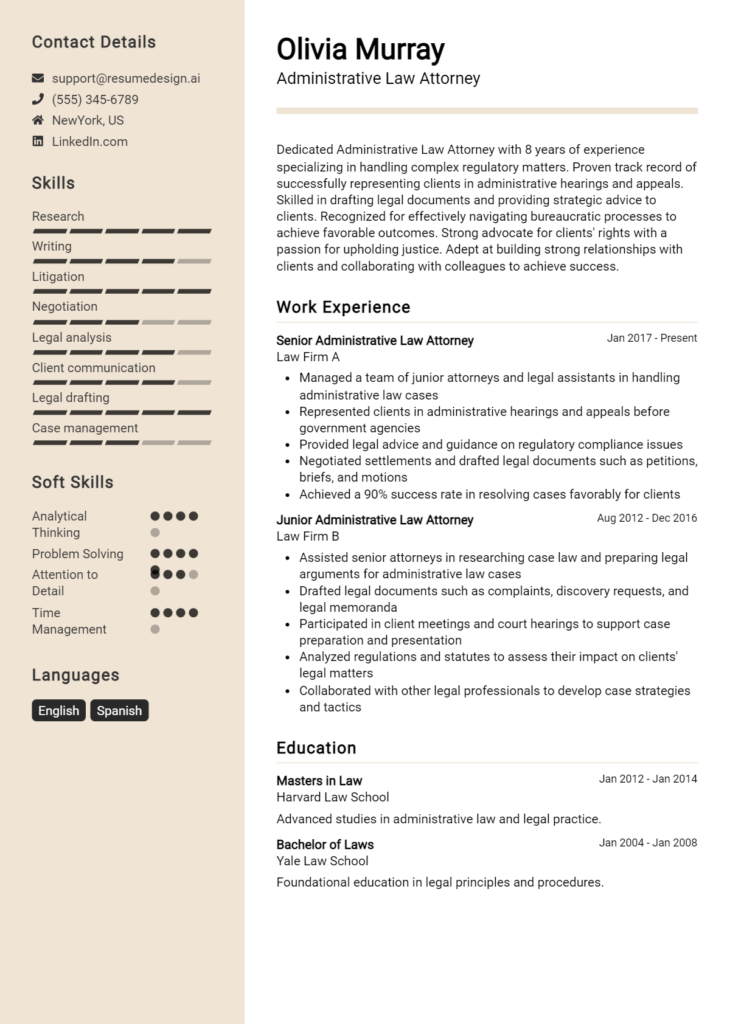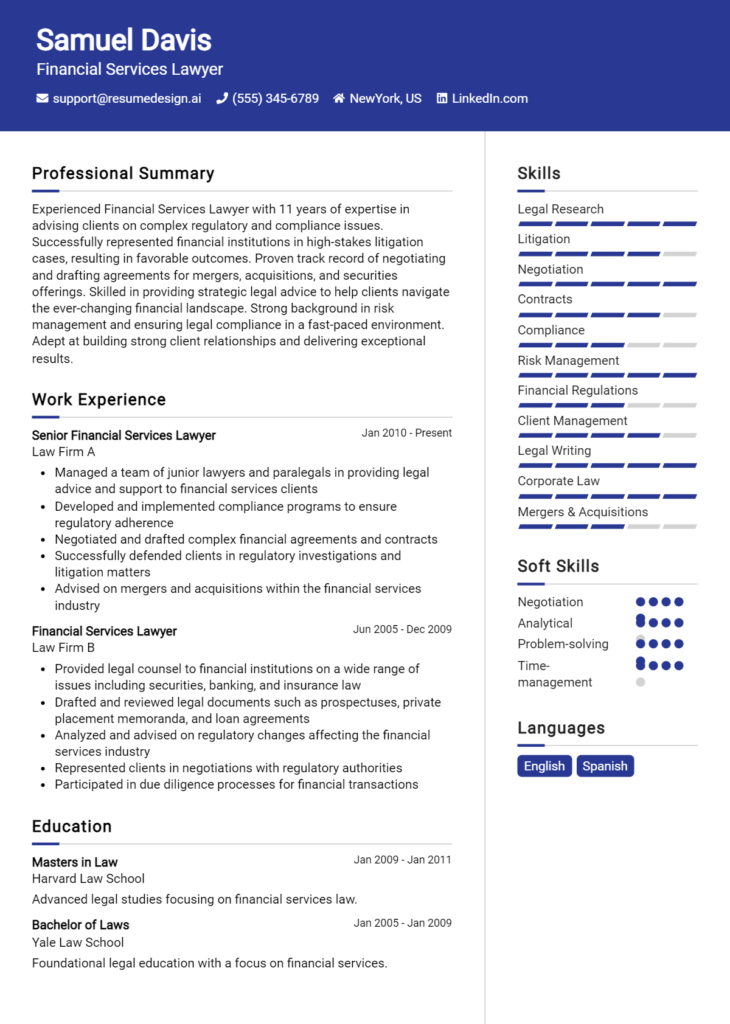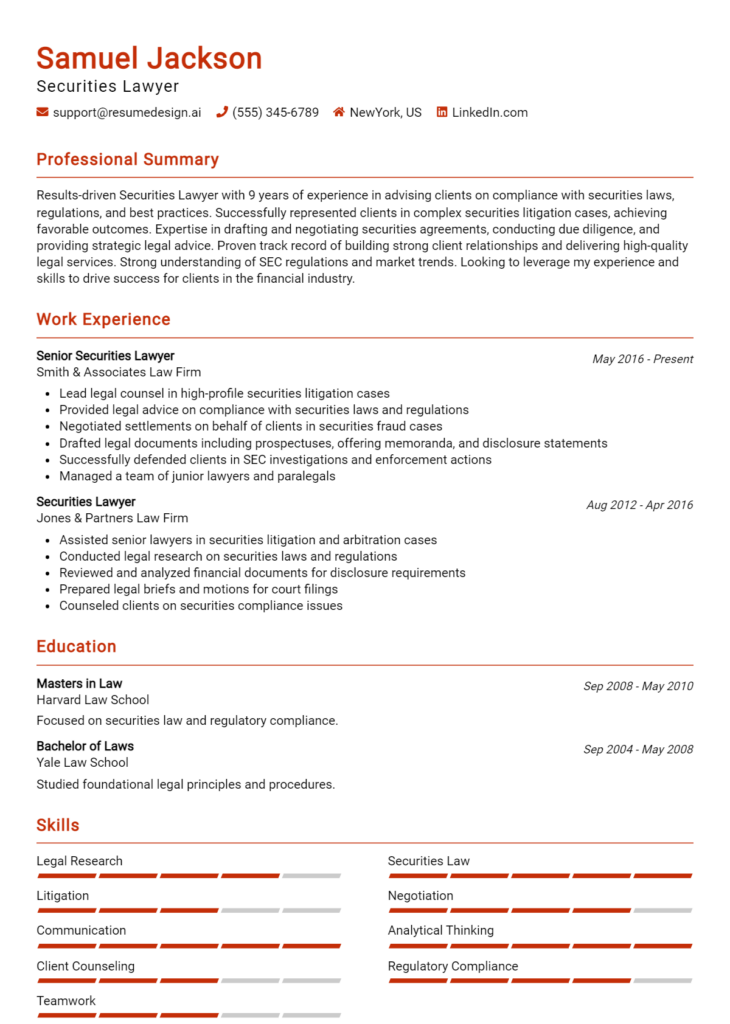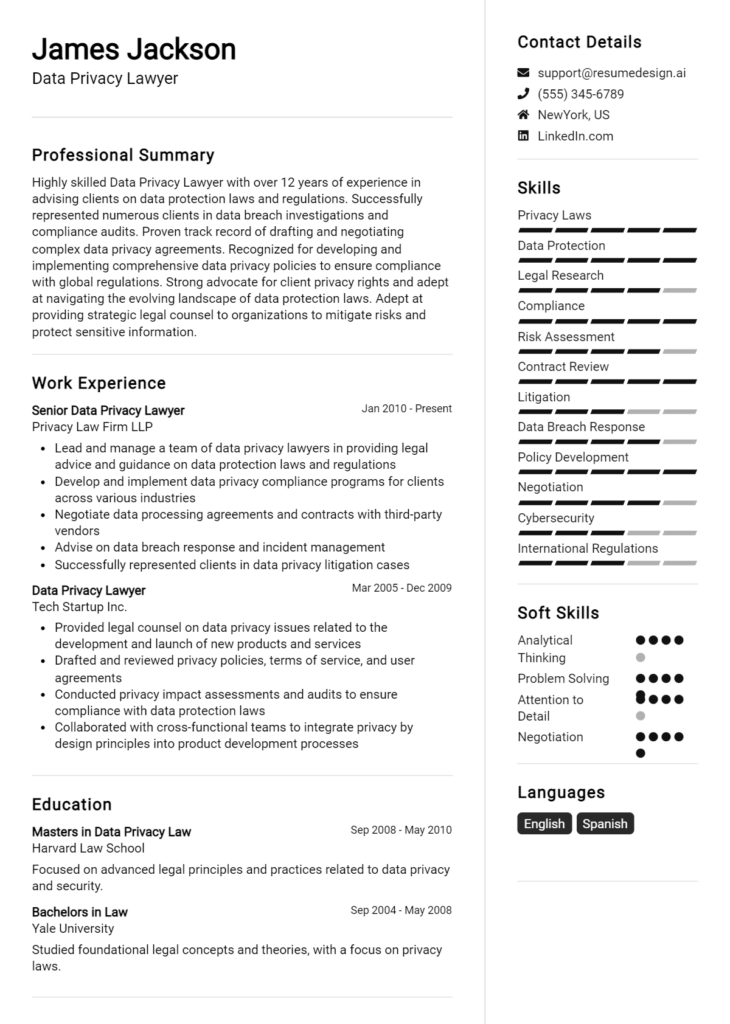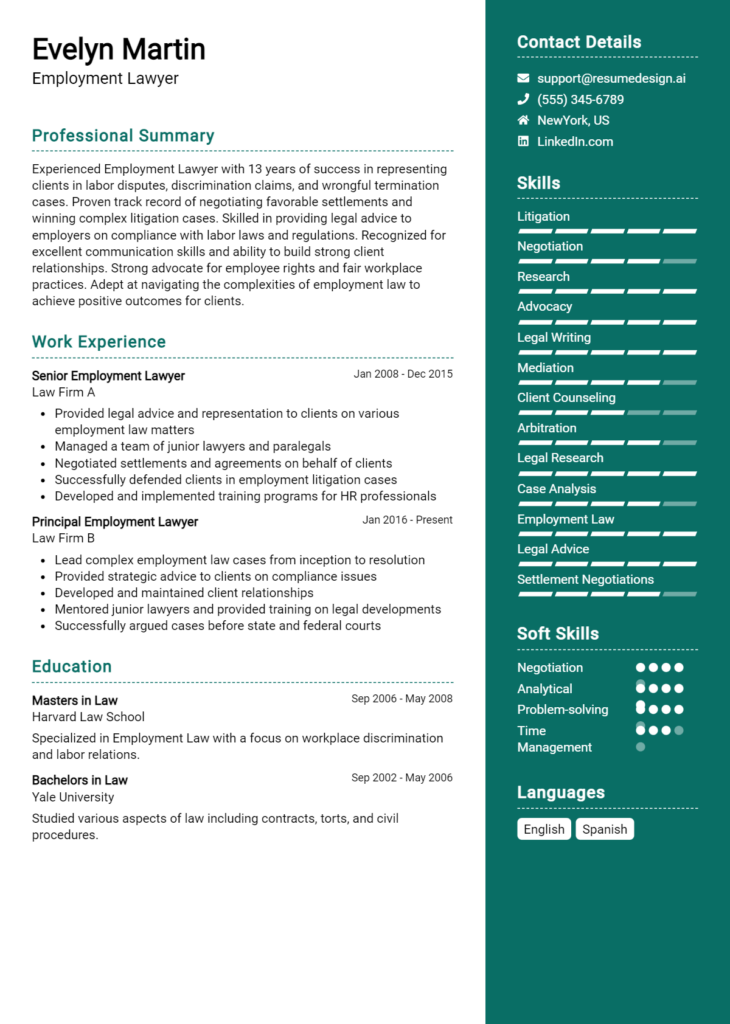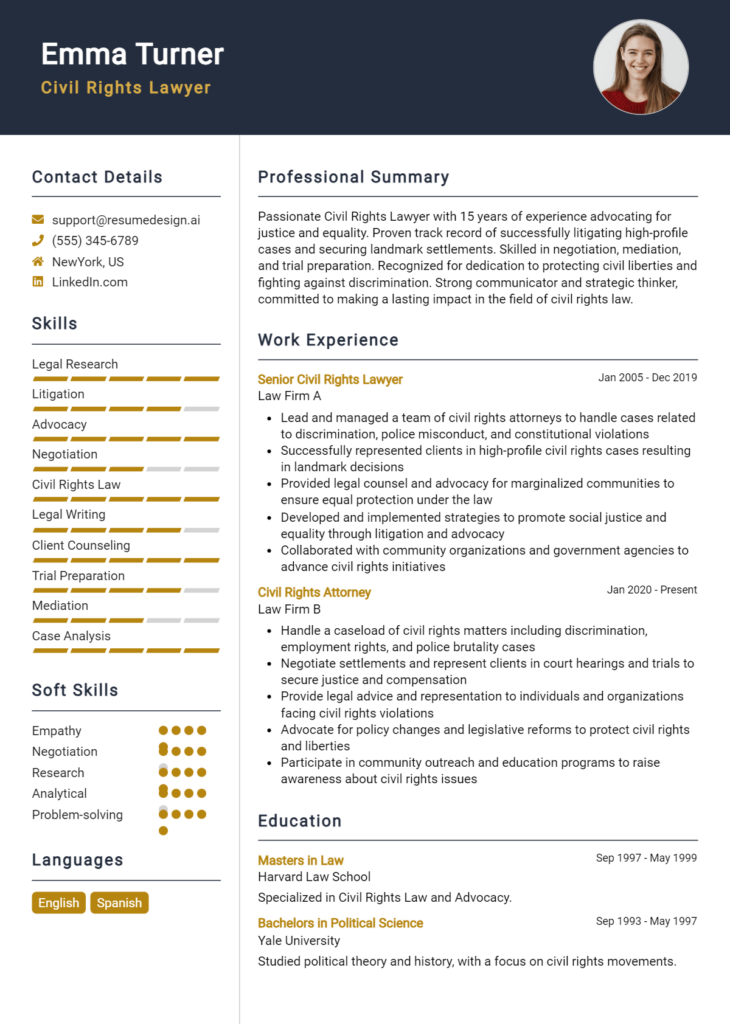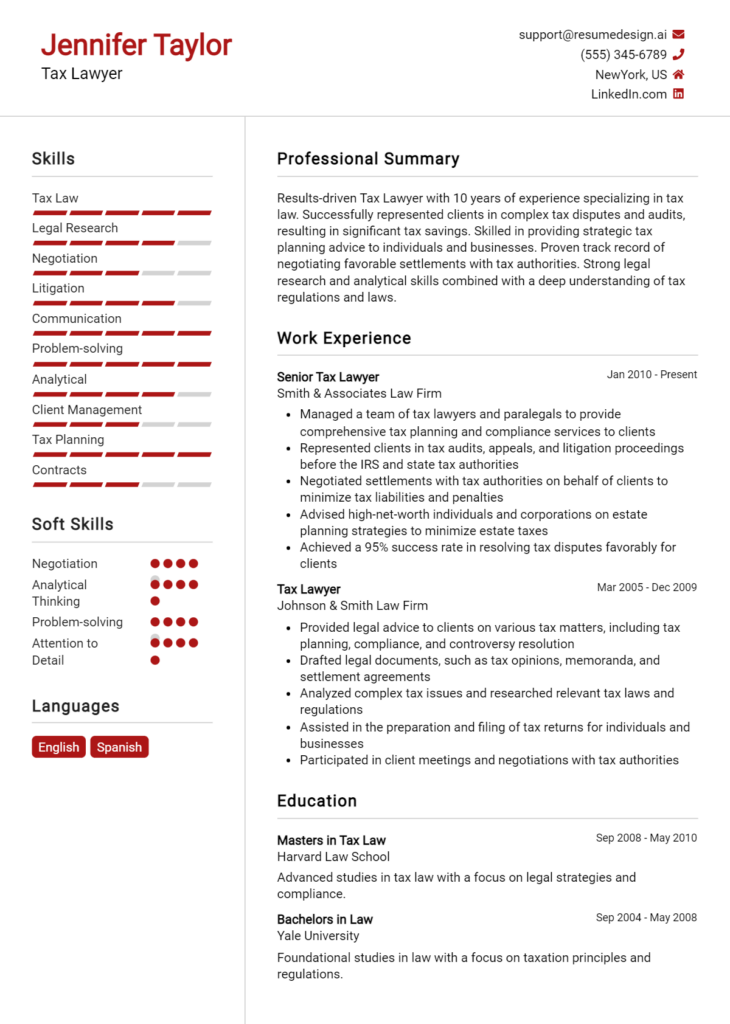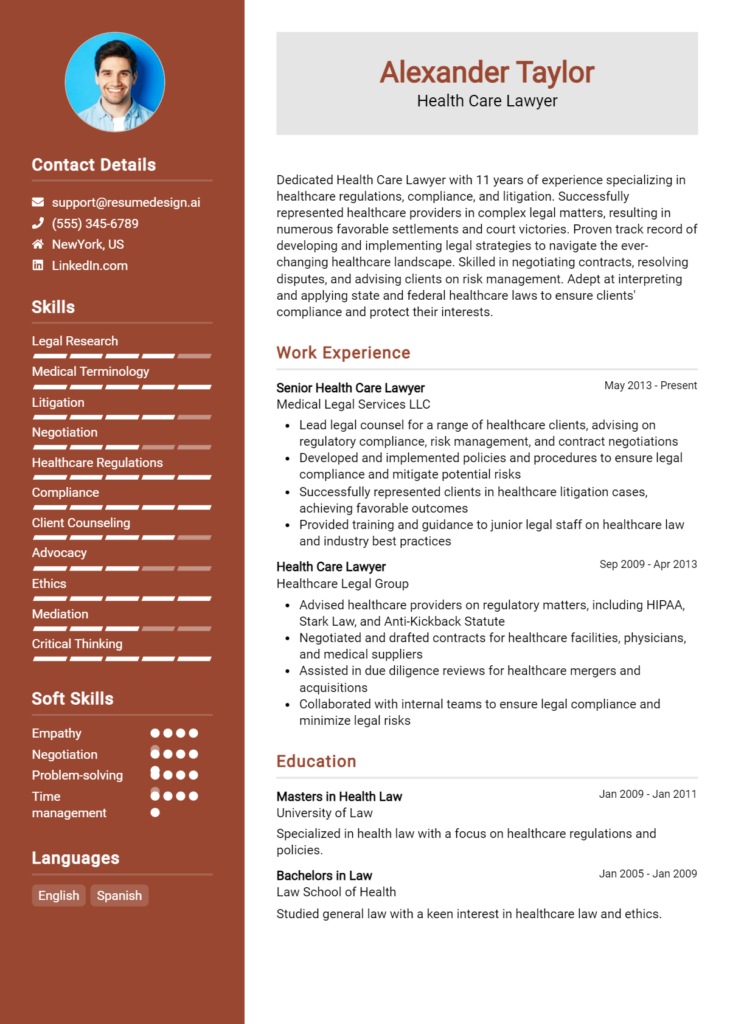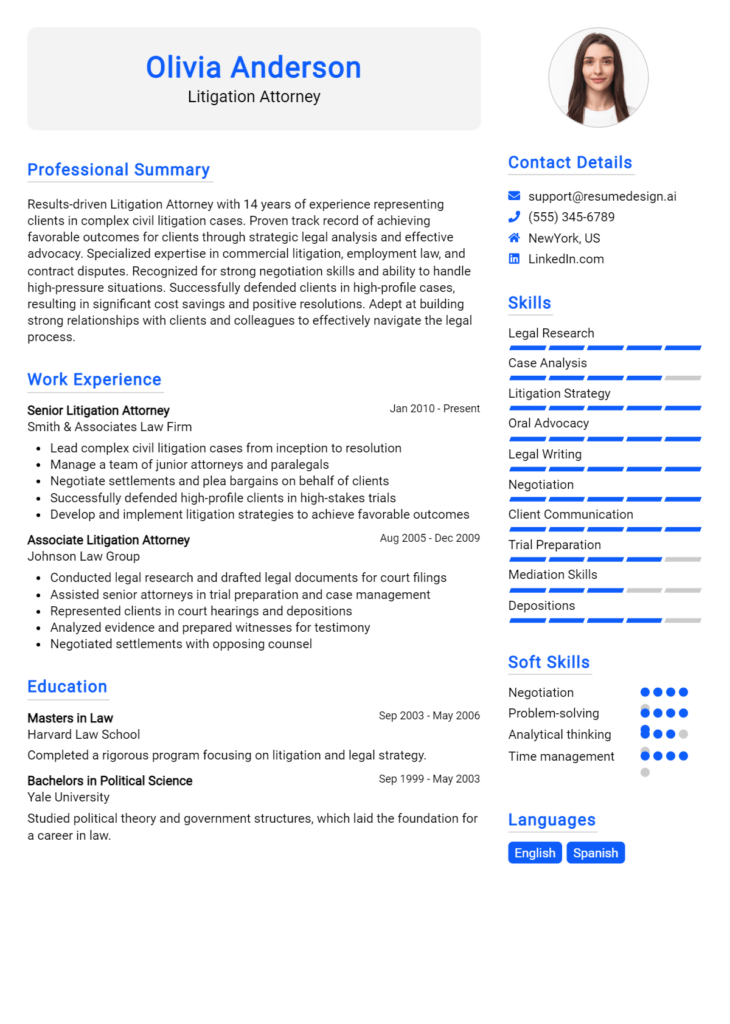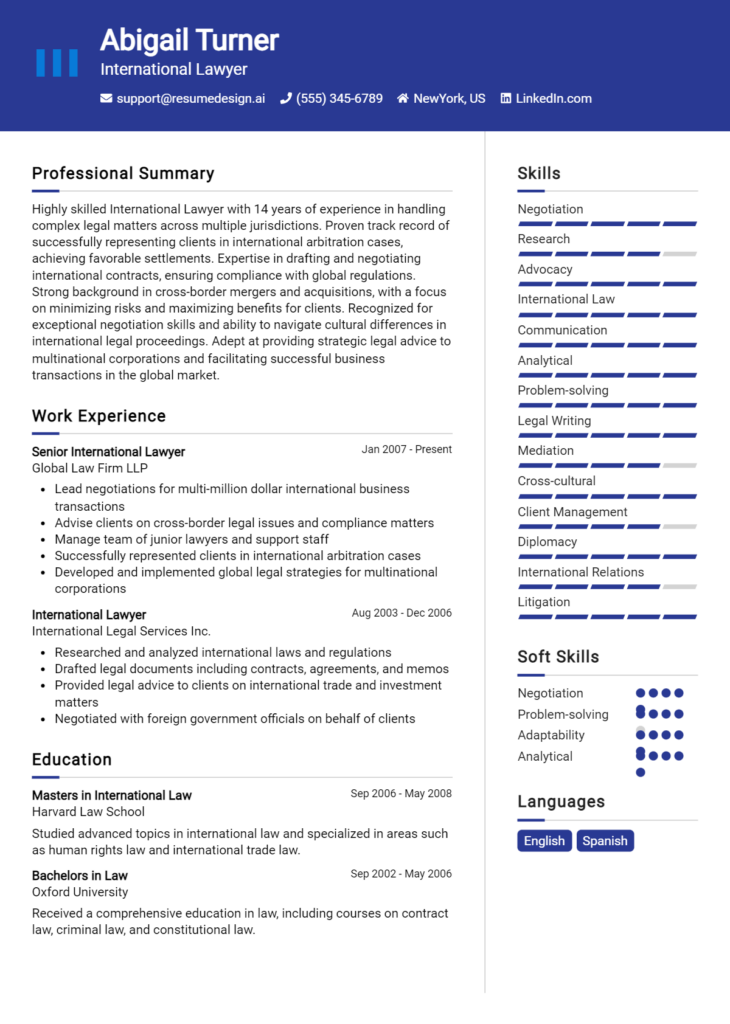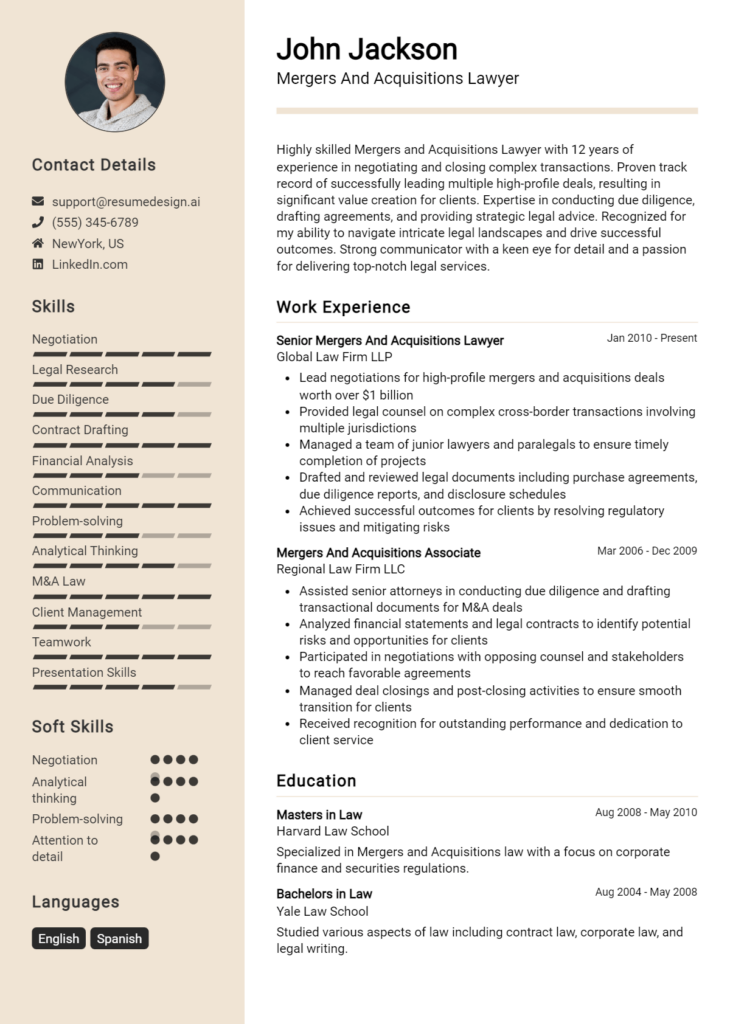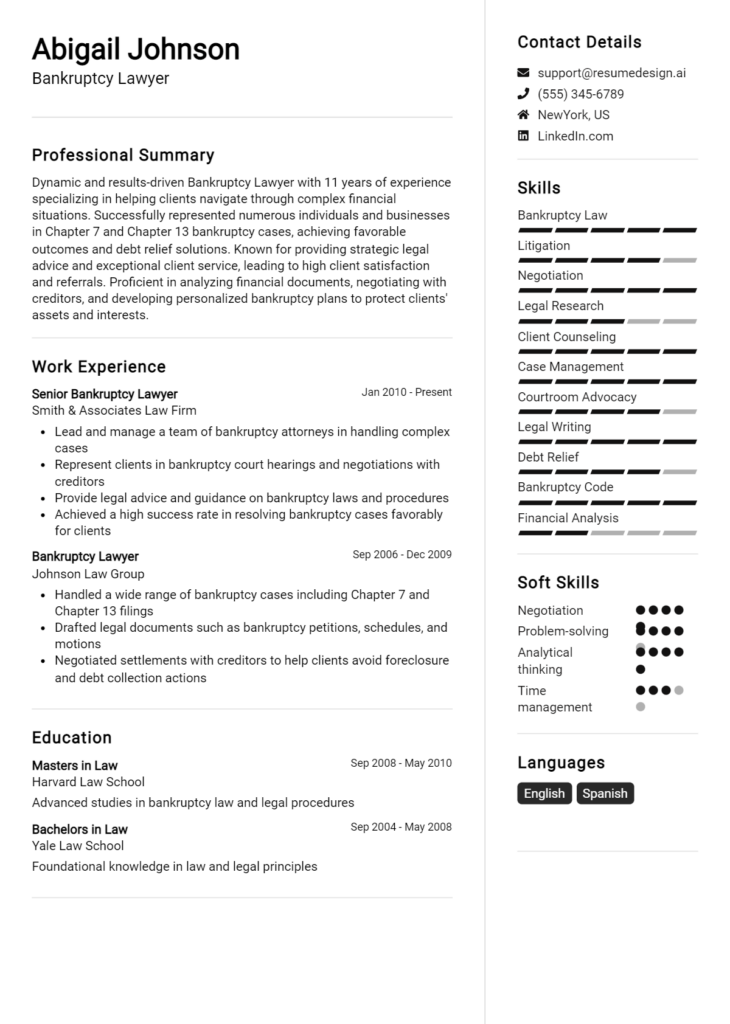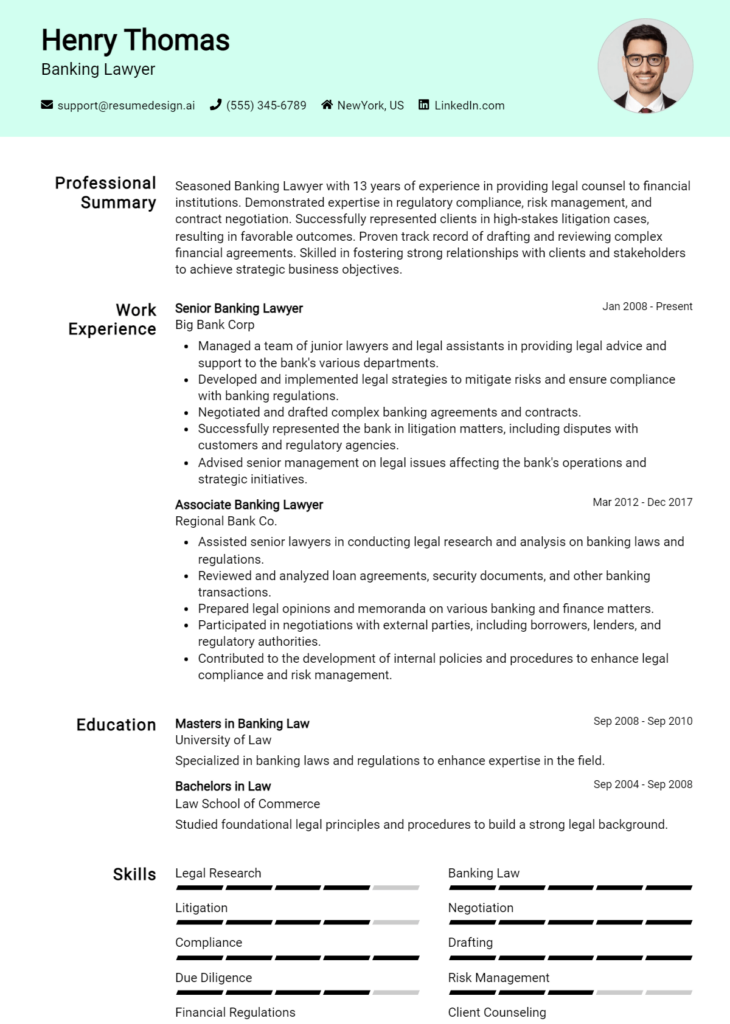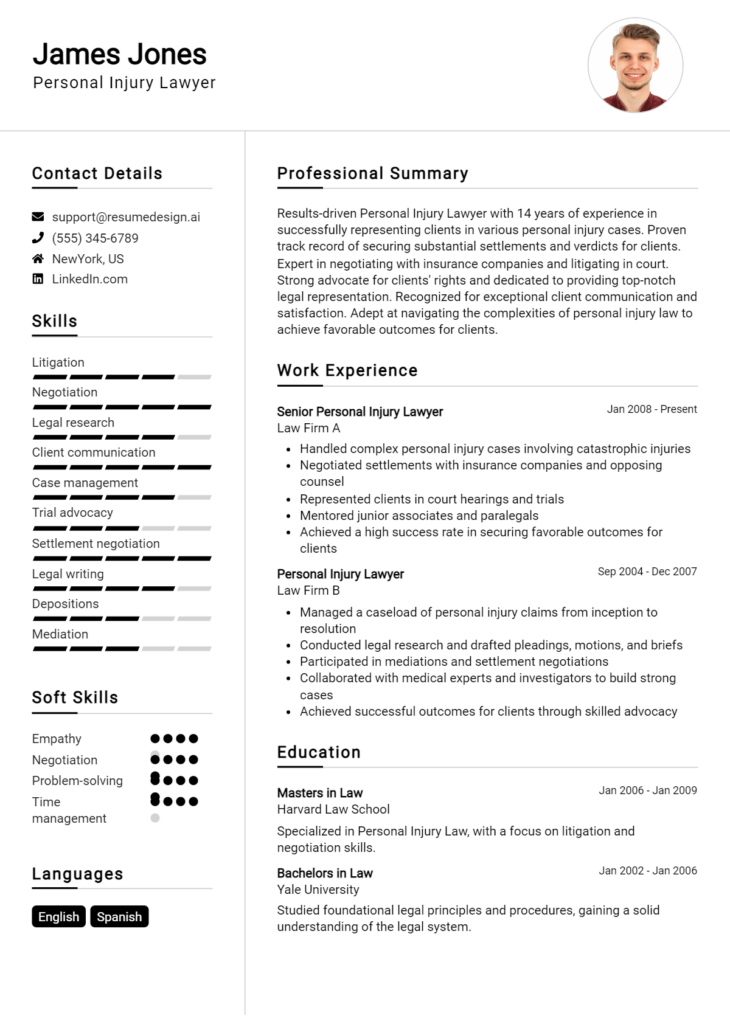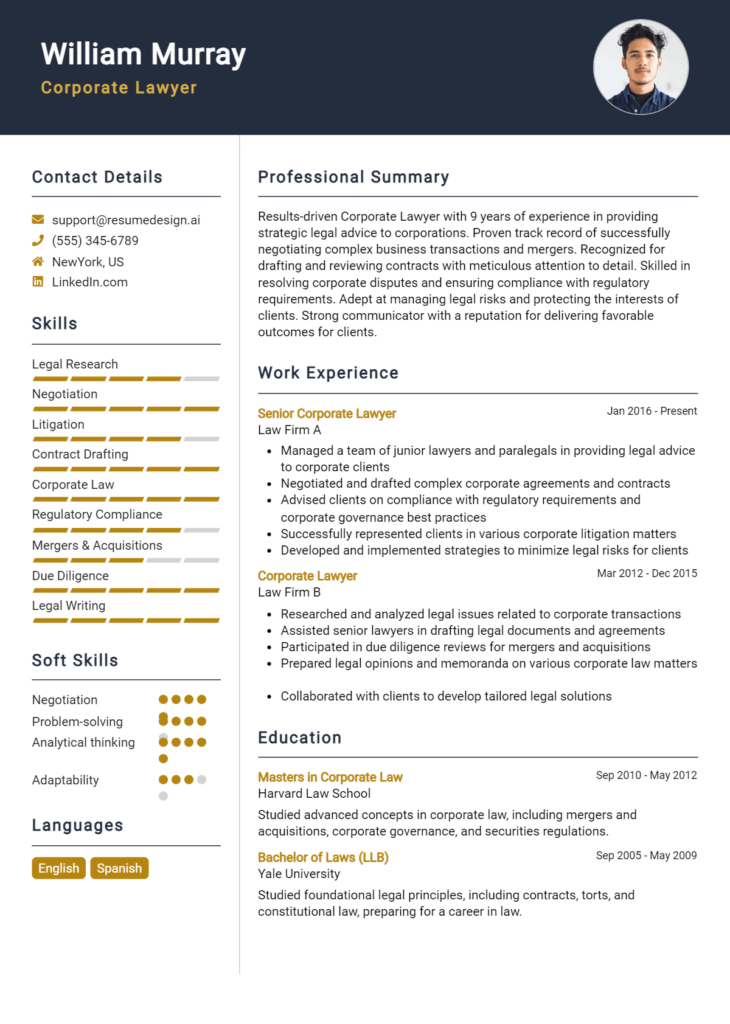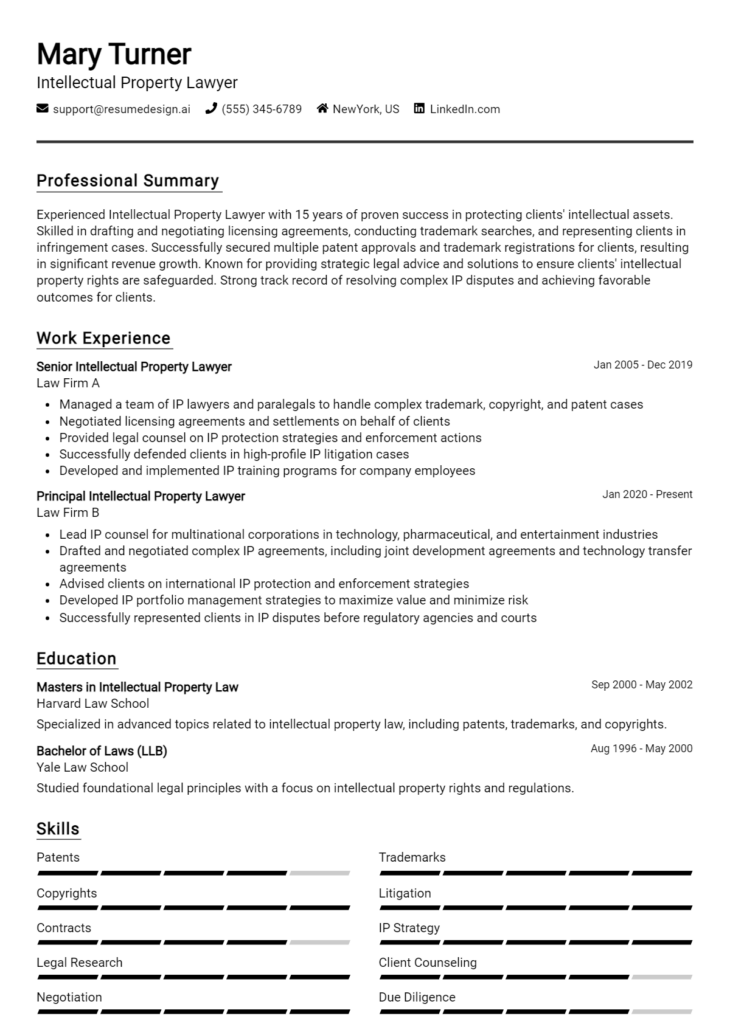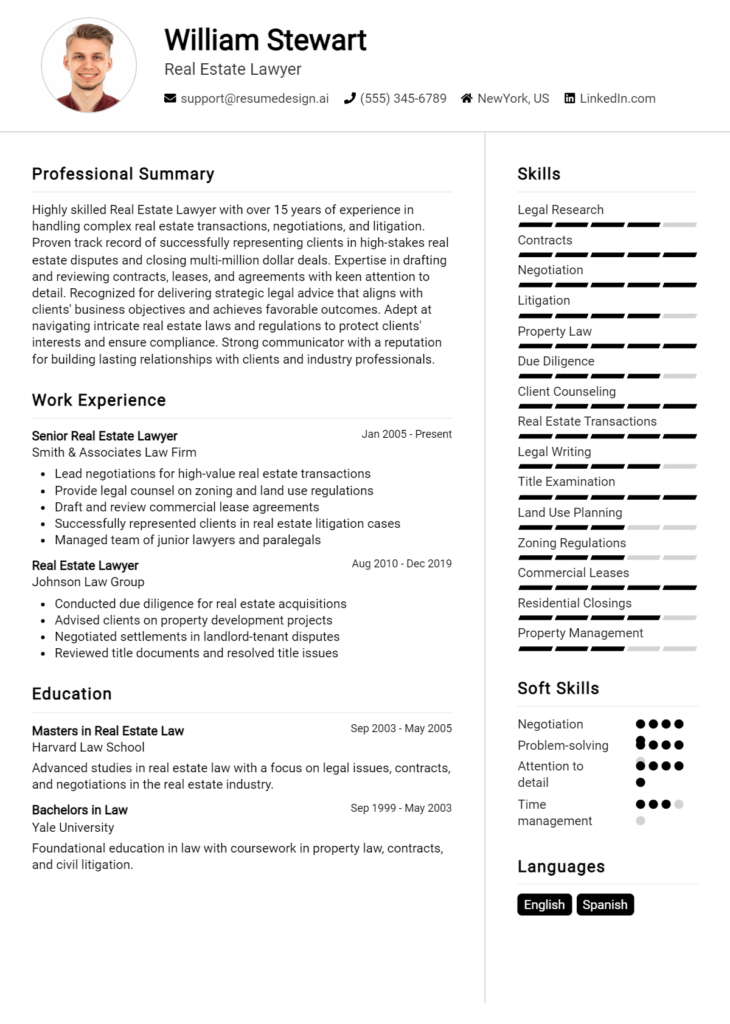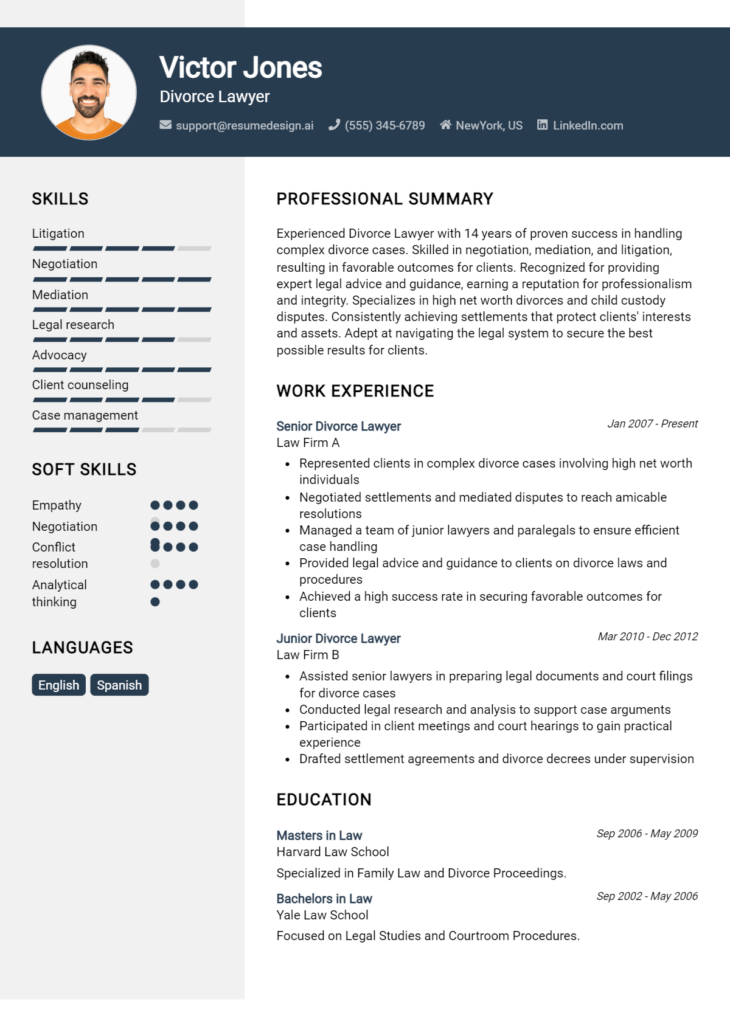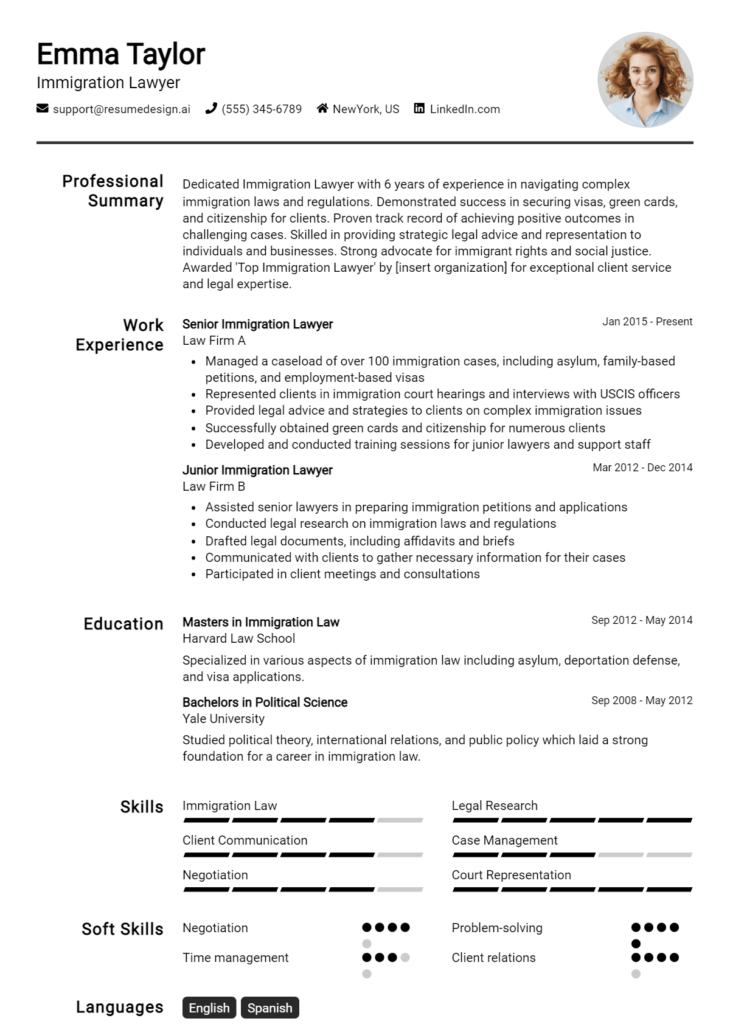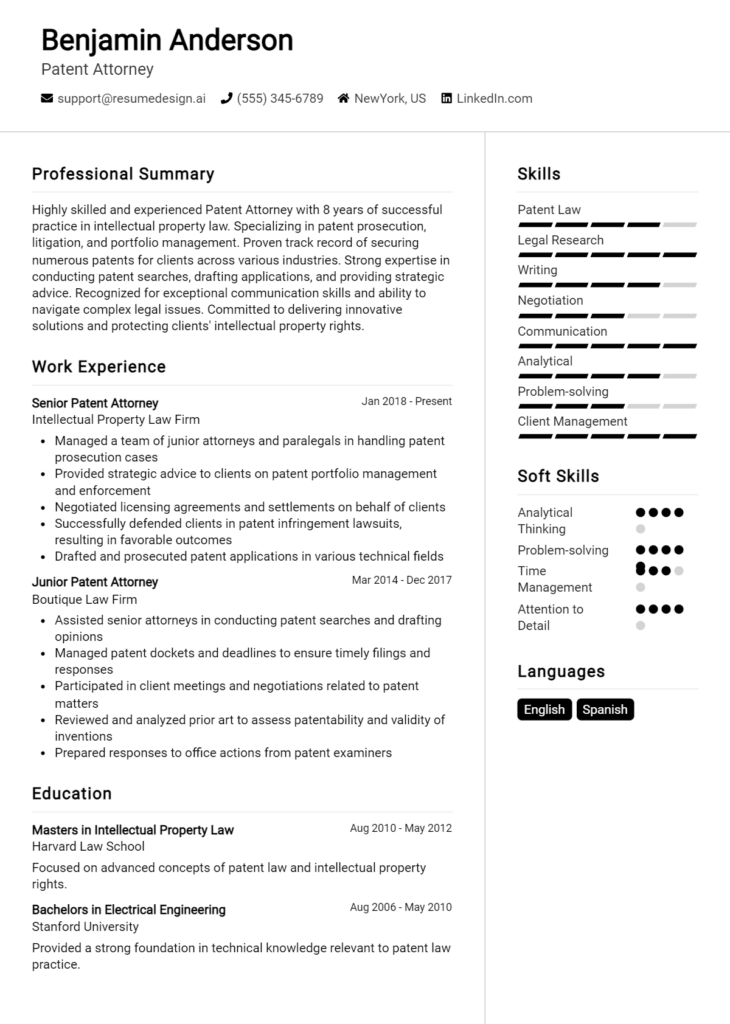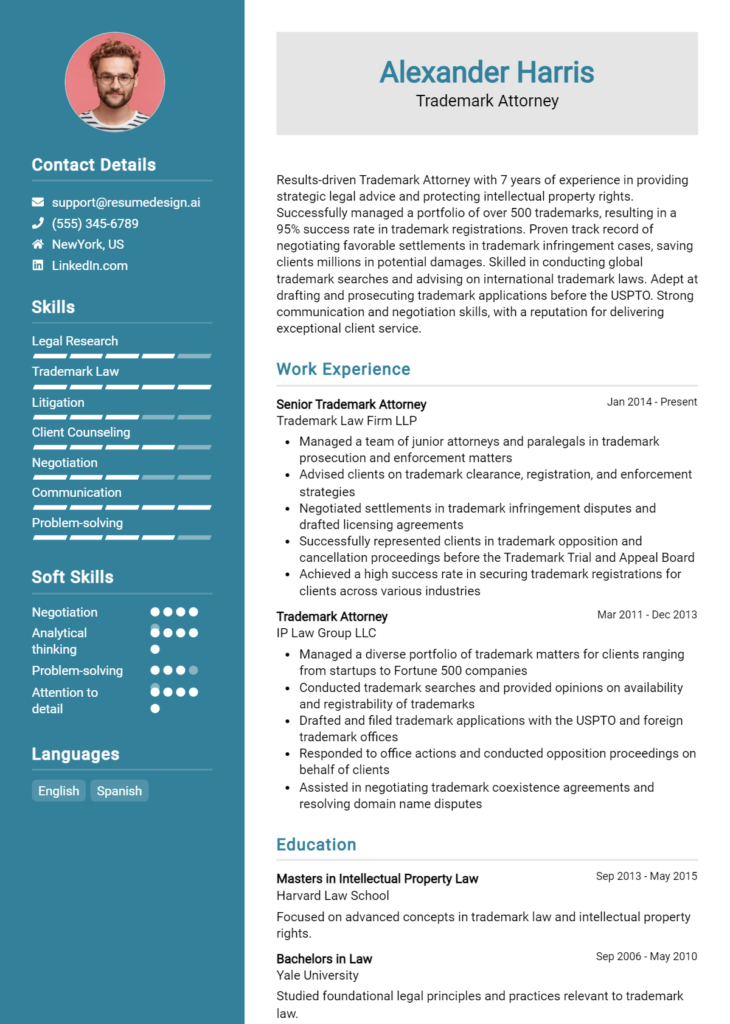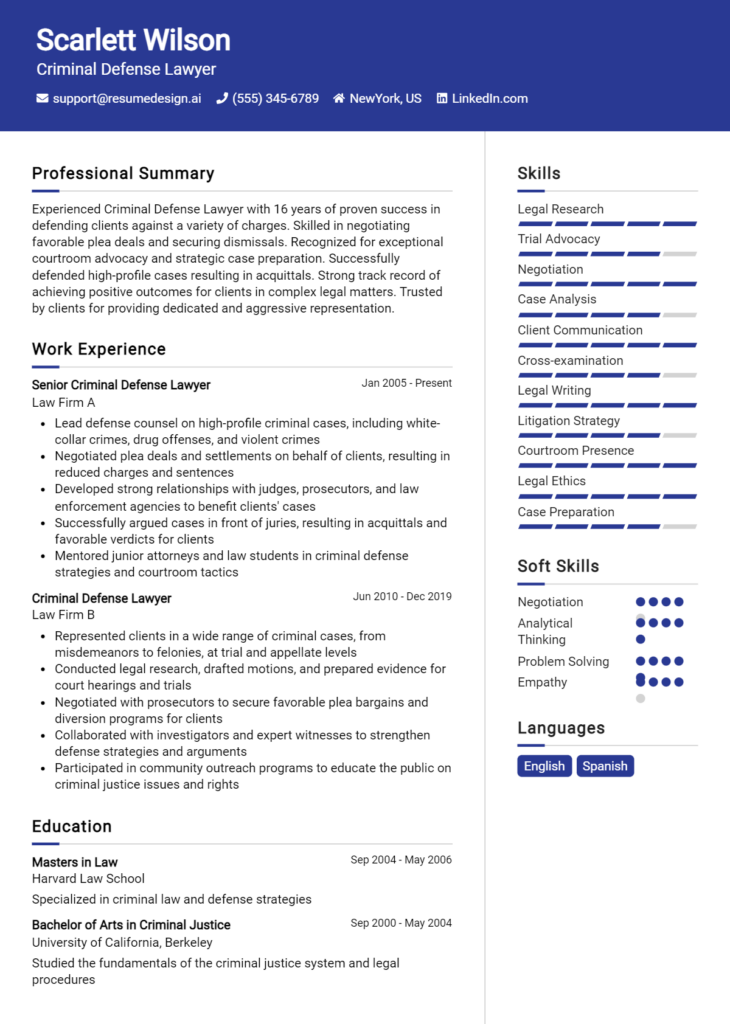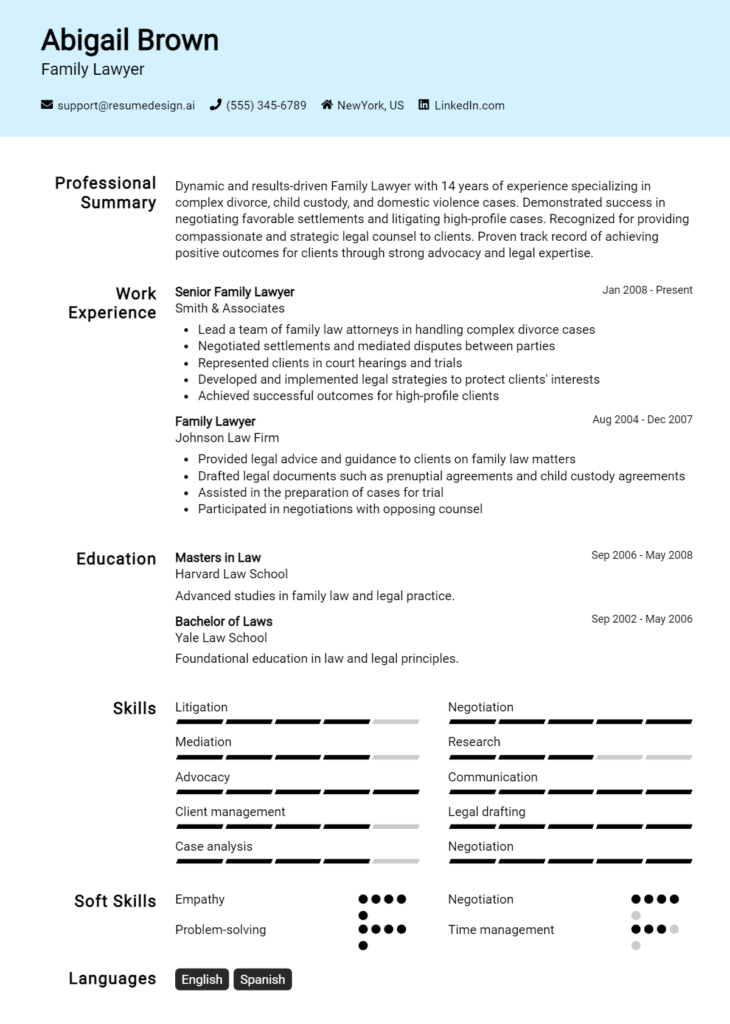Arbitration Lawyer Core Responsibilities
An Arbitration Lawyer plays a pivotal role in resolving disputes outside traditional court systems, necessitating a blend of technical expertise, operational understanding, and strong problem-solving abilities. They navigate complex legal frameworks, coordinate with various departments, and engage with clients to craft effective arbitration strategies. Mastery of negotiation, legal research, and analytical thinking is essential for achieving favorable outcomes, directly contributing to the organization’s goals. A well-structured resume can effectively highlight these qualifications, showcasing the candidate’s ability to bridge legal and operational functions.
Common Responsibilities Listed on Arbitration Lawyer Resume
- Represent clients in arbitration proceedings and negotiations.
- Draft and review arbitration agreements and legal documents.
- Conduct legal research to support case strategies.
- Prepare and present oral arguments and written submissions.
- Collaborate with internal teams and external counsel.
- Analyze evidentiary materials and develop case strategies.
- Advise clients on arbitration processes and compliance issues.
- Manage case timelines and ensure adherence to procedural rules.
- Facilitate communication between parties involved in arbitration.
- Evaluate risks and potential outcomes for clients.
- Negotiate settlements and resolve disputes amicably.
High-Level Resume Tips for Arbitration Lawyer Professionals
In the competitive field of arbitration law, a well-crafted resume is crucial for making a strong first impression on potential employers. It serves not only as a summary of your qualifications but also as a testament to your legal acumen and professionalism. Employers often sift through numerous applications, so your resume must not only highlight your relevant skills and achievements but also convey your unique value as an arbitration lawyer. This guide will provide practical and actionable resume tips specifically tailored for arbitration lawyer professionals, ensuring that your application stands out in a crowded job market.
Top Resume Tips for Arbitration Lawyer Professionals
- Tailor your resume to the specific job description, emphasizing the skills and experiences that align with the employer's needs.
- Showcase relevant arbitration experience, including notable cases, roles in dispute resolution, and any specific outcomes achieved.
- Quantify your achievements by including metrics such as the percentage of cases won, total amount of disputes resolved, or client satisfaction ratings.
- Highlight your industry-specific skills, such as negotiation, mediation, and legal research, that are essential for arbitration lawyers.
- Use clear and concise language, avoiding unnecessary jargon to ensure your resume is easily readable and impactful.
- Incorporate keywords from the job posting to pass through Applicant Tracking Systems (ATS) and capture the employer's attention.
- Include relevant certifications and memberships, such as those from arbitration associations or bar associations, to bolster your credentials.
- Demonstrate your understanding of various arbitration frameworks and laws applicable to the jurisdictions in which you operate.
- Maintain a professional format that is visually appealing and easy to navigate, ensuring that key information stands out.
By implementing these tips, you can significantly enhance your chances of landing a job in the arbitration lawyer field. A focused and strategically developed resume not only showcases your qualifications but also demonstrates your commitment to the profession, making you a more attractive candidate to potential employers.
Why Resume Headlines & Titles are Important for Arbitration Lawyer
In the competitive field of arbitration law, a well-crafted resume headline or title plays a crucial role in making a strong first impression. A compelling headline can immediately grab the attention of hiring managers, encapsulating a candidate's key qualifications and professional identity in a succinct and impactful phrase. This initial hook is vital, as it sets the tone for the entire resume and can influence the decision to read further. To maximize effectiveness, the headline should be concise, relevant, and directly related to the specific arbitration lawyer position being pursued, thereby showcasing the candidate's unique strengths and areas of expertise.
Best Practices for Crafting Resume Headlines for Arbitration Lawyer
- Keep it concise – aim for one to two impactful phrases.
- Focus on specific skills or experiences relevant to arbitration law.
- Incorporate keywords from the job description to align with employer needs.
- Highlight unique qualifications or accomplishments that set you apart.
- Use action-oriented language to convey confidence and capability.
- Avoid jargon or overly complex terms; simplicity is key.
- Tailor your headline for each application to reflect the specific role.
- Ensure it reflects a professional tone appropriate for the legal field.
Example Resume Headlines for Arbitration Lawyer
Strong Resume Headlines
"Experienced Arbitration Lawyer Specializing in Complex Commercial Disputes"
“Results-Driven Arbitration Specialist with a Proven Track Record of Favorable Outcomes”
“Dynamic Legal Strategist with 10+ Years in International Arbitration”
“Accomplished Arbitration Attorney Focused on Efficient Resolution and Client Advocacy”
Weak Resume Headlines
“Lawyer Looking for New Opportunities”
“Experienced Professional”
The strong headlines are effective because they are specific, highlighting relevant qualifications and experiences that directly align with the arbitration lawyer role. They utilize impactful language that reflects the candidate's expertise and successes, making a compelling case for why they should be considered for the position. In contrast, the weak headlines fail to impress due to their vagueness and lack of detail, leaving hiring managers uninspired and without a clear understanding of the candidate's value. A strong headline can make all the difference in capturing attention in a crowded applicant pool.
Writing an Exceptional Arbitration Lawyer Resume Summary
A well-crafted resume summary is essential for an Arbitration Lawyer, as it serves as the first impression to hiring managers. This brief yet powerful introduction can effectively showcase key skills, relevant experience, and notable accomplishments within the field of arbitration. A strong summary quickly captures attention and highlights how the candidate's qualifications align with the specific needs of the job they are applying for. It should be concise and impactful, ensuring that crucial information is communicated clearly and tailored to the role in question.
Best Practices for Writing a Arbitration Lawyer Resume Summary
- Quantify achievements: Use specific numbers or percentages to demonstrate your impact in previous roles.
- Focus on relevant skills: Highlight the key skills that are most applicable to the arbitration role.
- Tailor for the job description: Customize your summary for each application by incorporating keywords from the job description.
- Keep it concise: Aim for 2-4 sentences that deliver maximum information without unnecessary fluff.
- Use strong action verbs: Start sentences with dynamic verbs to convey confidence and proactivity.
- Highlight unique selling points: Identify what sets you apart from other candidates and emphasize those qualities.
- Be professional yet personable: Strike a balance between professionalism and a touch of personality to engage the reader.
Example Arbitration Lawyer Resume Summaries
Strong Resume Summaries
Accomplished Arbitration Lawyer with over 10 years of experience in resolving complex commercial disputes. Successfully secured a 95% favorable outcome rate for clients in high-stakes arbitration cases, significantly reducing litigation costs by an average of 30%.
Detail-oriented Arbitration Lawyer specializing in international trade disputes, adept at navigating multi-jurisdictional regulations. Led a team that achieved a landmark ruling, saving the client $3 million in potential fines.
Results-driven Arbitration Lawyer with a proven track record of negotiating successful settlements for Fortune 500 clients. Expertise in managing high-volume caseloads and reducing arbitration timelines by 40% through effective case strategy.
Weak Resume Summaries
Experienced lawyer with knowledge of arbitration processes. I work well with clients and have handled various cases.
Skilled in arbitration and dispute resolution. Looking for opportunities to utilize my legal skills in a challenging environment.
The strong resume summaries effectively highlight specific achievements, quantifiable outcomes, and relevant skills tailored to the arbitration field, showcasing the candidate's expertise and value. In contrast, the weak resume summaries lack specificity and measurable results, making them appear generic and unmemorable, which may fail to capture the attention of hiring managers.
Work Experience Section for Arbitration Lawyer Resume
The work experience section of an Arbitration Lawyer resume plays a crucial role in showcasing the candidate's professional journey and technical expertise. This section not only highlights the candidate's ability to navigate complex legal frameworks and arbitration processes but also demonstrates their capacity to lead teams and deliver high-quality outcomes in high-stakes environments. By quantifying achievements and aligning experiences with industry standards, candidates can effectively communicate their value to potential employers, making this section fundamental to a compelling resume.
Best Practices for Arbitration Lawyer Work Experience
- Detail your technical skills related to arbitration, including knowledge of relevant laws, regulations, and procedural rules.
- Quantify achievements with specific metrics, such as the number of successful cases, the amount of money recovered, or the percentage of favorable outcomes.
- Highlight leadership roles and team management experiences, showcasing your ability to guide and mentor junior lawyers and support staff.
- Emphasize collaboration with clients, opposing counsel, and other stakeholders to illustrate your interpersonal skills and teamwork abilities.
- Use action verbs and concise language to convey your contributions clearly and effectively.
- Align your experiences with industry standards and the specific requirements of the job you are applying for.
- Include relevant certifications or specialized training that enhance your qualifications as an arbitration lawyer.
- Focus on continuous learning and professional development to demonstrate your commitment to staying current in the field.
Example Work Experiences for Arbitration Lawyer
Strong Experiences
- Successfully represented a multinational corporation in a $10 million arbitration, achieving a favorable settlement that saved the client 30% in potential damages.
- Led a team of five attorneys in a complex arbitration case, which resulted in a 40% reduction in litigation costs through efficient case management and strategic negotiation.
- Developed and implemented a comprehensive training program for junior associates on arbitration procedures, enhancing the team's overall performance and case handling capabilities.
- Collaborated with expert witnesses and industry specialists to prepare compelling evidence in a high-profile arbitration case, resulting in a unanimous decision in favor of the client.
Weak Experiences
- Worked on various arbitration cases without specifying outcomes or contributions.
- Assisted in legal research and drafting documents for arbitration without indicating the impact of these efforts.
- Participated in team meetings and discussions related to arbitration but did not define a leadership role or specific contributions.
- Handled client communications for arbitration cases without detailing the effectiveness or results of these interactions.
The examples of strong experiences are considered effective because they provide specific, quantifiable achievements that demonstrate a candidate's technical expertise and leadership capabilities. They showcase how the candidate contributed to successful outcomes and highlight their ability to work collaboratively. In contrast, the weak experiences lack detail and measurable results, making them less impactful and failing to illustrate the candidate's true potential in the arbitration field.
Education and Certifications Section for Arbitration Lawyer Resume
The education and certifications section of an Arbitration Lawyer's resume is crucial as it showcases the candidate's academic qualifications, industry-specific certifications, and commitment to continuous professional development. This section serves not only to highlight the foundational knowledge acquired through formal education but also to demonstrate the candidate's dedication to maintaining relevance in a continuously evolving field. By providing details about relevant coursework, certifications, and specialized training, candidates can significantly enhance their credibility and align their qualifications with the specific demands of the role, making them more appealing to potential employers.
Best Practices for Arbitration Lawyer Education and Certifications
- Include only relevant degrees and certifications that pertain to arbitration and dispute resolution.
- List your educational qualifications in reverse chronological order, starting with the most recent.
- Highlight advanced degrees such as a Master of Laws (LL.M.) in Arbitration or Dispute Resolution.
- Incorporate well-recognized certifications from authoritative organizations, such as the Chartered Institute of Arbitrators.
- Provide a brief description of relevant coursework that demonstrates expertise in arbitration law.
- Include any specialized training programs that enhance your skills in mediation or negotiation.
- Clearly indicate the institutions where you received your education and certifications, ensuring they are reputable.
- Avoid including outdated or irrelevant qualifications that do not contribute to your current professional standing.
Example Education and Certifications for Arbitration Lawyer
Strong Examples
- Juris Doctor (JD), Harvard Law School, 2015 - Focus on Alternative Dispute Resolution and International Arbitration
- Master of Laws (LL.M.) in Arbitration and Dispute Resolution, University of London, 2018
- Certificate in Mediation and Conflict Resolution, American Bar Association, 2019
- Chartered Arbitrator (CIArb), Chartered Institute of Arbitrators, 2020
Weak Examples
- Bachelor of Arts in English Literature, State University, 2010 - Not relevant to legal practice
- Certificate in Basic Computer Skills, Community College, 2012 - Lacks relevance to arbitration law
- Diploma in Office Administration, Online Course, 2019 - Does not enhance legal qualifications
- Old certification in Family Law Mediation, 2015 - Outdated and not applicable to arbitration
The examples provided highlight the importance of relevance and specificity in educational qualifications and certifications. Strong examples demonstrate a clear focus on arbitration and dispute resolution with recognized degrees and certifications that enhance the candidate's qualifications for the role. In contrast, weak examples reflect outdated or irrelevant educational backgrounds that do not contribute to the candidate's effectiveness as an Arbitration Lawyer, potentially diminishing their appeal to employers in the field.
Top Skills & Keywords for Arbitration Lawyer Resume
As an Arbitration Lawyer, possessing the right skills is crucial for navigating complex legal disputes and effectively representing clients in arbitration proceedings. A well-crafted resume that highlights both hard and soft skills can significantly enhance a candidate's appeal to potential employers. These skills not only demonstrate legal expertise but also showcase the interpersonal qualities necessary for successful negotiation and conflict resolution. In a competitive legal landscape, emphasizing relevant skills can set an arbitration lawyer apart, making it essential to carefully curate this section of the resume.
Top Hard & Soft Skills for Arbitration Lawyer
Soft Skills
- Negotiation
- Communication
- Critical Thinking
- Problem-Solving
- Persuasion
- Interpersonal Skills
- Emotional Intelligence
- Adaptability
- Time Management
- Team Collaboration
- Conflict Resolution
- Analytical Thinking
- Active Listening
- Attention to Detail
- Client Relationship Management
- Strategic Thinking
- Cultural Competence
Hard Skills
- Legal Research
- Drafting Arbitration Agreements
- Case Analysis
- Knowledge of Arbitration Laws
- Regulatory Compliance
- Evidence Presentation
- Risk Assessment
- Mediation Techniques
- Trial Preparation
- Familiarity with Arbitration Institutions
- Document Review
- Legal Writing
- Financial Acumen
- Familiarity with Industry Standards
- Technology Proficiency (e.g., legal software)
- Case Management
- Understanding of International Arbitration
- Advocacy Skills
Highlighting these skills on a resume can significantly influence an employer's perception of a candidate's qualifications, while a solid work experience section can complement these skills by providing concrete examples of how they have been applied in practice.
Stand Out with a Winning Arbitration Lawyer Cover Letter
Dear [Hiring Manager's Name],
I am writing to express my interest in the Arbitration Lawyer position at [Company's Name] as advertised on [Where You Found the Job Posting]. With a robust background in dispute resolution and a proven track record of successfully representing clients in arbitration proceedings, I am confident in my ability to contribute effectively to your esteemed firm. My experience spans various industries, including commercial, construction, and international arbitration, allowing me to bring a diverse perspective to complex legal issues.
Throughout my career, I have honed my skills in legal research, negotiation, and advocacy, ensuring that my clients receive the most favorable outcomes possible. At [Previous Company Name], I led a team in a high-stakes arbitration case that resulted in a favorable settlement for our client, saving them significant financial resources. My meticulous attention to detail and commitment to achieving justice have earned me recognition from peers and clients alike. I am adept at managing multiple cases simultaneously, always prioritizing client communication and satisfaction.
I am particularly drawn to [Company's Name] because of its reputation for excellence in arbitration and its commitment to innovative legal solutions. I admire your dedication to providing personalized legal strategies, and I believe my proactive approach and strong analytical skills align perfectly with your firm's values. I am eager to bring my expertise in arbitration law to your team and contribute to your continued success in resolving disputes efficiently and effectively.
Thank you for considering my application. I look forward to the opportunity to discuss how my skills and experiences align with the needs of [Company's Name]. I am excited about the potential to contribute to your firm’s success and help clients navigate the complexities of arbitration. Please feel free to contact me at [Your Phone Number] or [Your Email] to arrange a meeting.
Sincerely,
[Your Name]
[Your LinkedIn Profile or Website, if applicable]
Common Mistakes to Avoid in a Arbitration Lawyer Resume
Crafting a compelling resume as an Arbitration Lawyer is crucial to standing out in a competitive field. However, many candidates make common mistakes that can undermine their qualifications and experiences. To enhance your chances of landing an interview, it's essential to avoid these pitfalls:
Overly Complex Language: Using jargon or legalese can alienate readers. Aim for clarity and conciseness to ensure your resume is accessible to both legal and non-legal professionals.
Neglecting Relevant Experience: Failing to highlight specific arbitration experience can be detrimental. Tailor your resume to emphasize roles and achievements directly related to arbitration law.
Ignoring Keywords: Many employers use applicant tracking systems (ATS) to filter resumes. Not including relevant keywords from the job description can result in your resume being overlooked.
Lack of Quantifiable Achievements: Simply listing job duties is insufficient. Use specific metrics or examples to demonstrate your success in past roles, such as the number of cases handled or awards won.
Outdated Information: Including old or irrelevant experiences can clutter your resume. Focus on your most recent and relevant roles to maintain a clear narrative of your professional journey.
Poor Formatting: An unorganized or cluttered resume can hinder readability. Ensure your resume has a clean, professional layout with consistent formatting for headings, bullet points, and fonts.
Ignoring Soft Skills: Arbitration requires strong interpersonal skills. Neglecting to mention abilities like negotiation, communication, and conflict resolution can make your resume less impactful.
Too Long or Too Short: Striking the right balance in resume length is essential. A succinct one-page resume is often ideal, but if you have extensive experience, two pages may be acceptable. Avoid unnecessary filler content to maintain focus.
Conclusion
As an Arbitration Lawyer, your expertise in resolving disputes outside of the courtroom is invaluable. Throughout this article, we explored the essential skills and qualifications that distinguish successful arbitration lawyers, including strong negotiation abilities, in-depth knowledge of arbitration laws, and effective communication skills. We also highlighted the importance of experience, whether through formal education or practical exposure in the field of dispute resolution.
With the competitive nature of the legal industry, having a standout resume is crucial to securing opportunities in arbitration. It's essential to showcase your unique skills and experiences in a manner that captures the attention of potential employers.
Now is the perfect time to take a closer look at your Arbitration Lawyer Resume. Make sure it reflects your strengths and aligns with the requirements of the roles you are targeting. To assist you in this process, consider utilizing various resources available at your disposal. You can explore resume templates to find a design that best suits your style, use the resume builder for a streamlined approach to crafting your resume, and review resume examples to inspire your own content. Additionally, don't forget to check out cover letter templates to complement your application materials.
Take action today and ensure your resume stands out in the competitive field of arbitration law!

